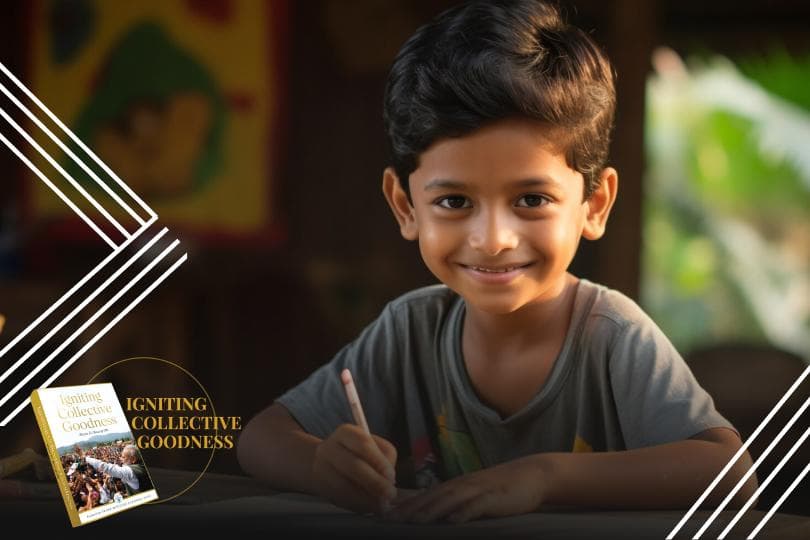Empowering India's Youth
Insights from Prime Minister Narendra Modi's journey of Wisdom, Perspective, and Inspiration for the Future of India

The chapter "Strengthening the Future of Gen Next" in Igniting Collective Goodness, Mann Ki Baat@100 delves into the crucial dialogues and concerns involving young people, their parents, and educators throughout India.
Prime Minister Modi’s words of wisdom and striking insights regarding his own life journey and the perspective and wisdom he offers to young people are like nuggets of wisdom shining like diamonds in a sea of glass:
“I never scored well in my exams in my life. I was an average student, and on top of that, I had very bad handwriting. So I think that most of the time I passed my exams only because the teachers could not comprehend my handwriting.”
“Be calm, enjoy life, and seek inner happiness.”
“Friends, mathematics is a subject with which we Indians should be very comfortable. After all, the people of India have contributed the most to the whole world in terms of research and the understanding of mathematics.”
“Don’t be bothered about defeating others. Think of taking yourself further from where you already are.”
Modi’s Mann Ki Baat programs on the topic of exams and the mental health of India's students were not only inspiring, as detailed in "Igniting Collective Goodness," but they also offered practical advice, akin to a tender uncle, older friend, or wise grandparent offering guidance to a young person embarking on life's journey.
In his early broadcasts, Modi discussed at length the students' fear of exams and the subsequent relief when given the Prime Minister's perspective. “My dear young friends, by now you must have gotten off the treadmill of exams, exams, and more exams,” Modi went on to suggest that students pursue internships throughout their summers. “It is an altogether new experience, which gives an opportunity to get to know life afresh, away from the closeted walls, away from pen, paper, and computers.”
He introduced incentives to encourage this undertaking through credit points accrued by the University Grants Commission (UGC) in recognition of taking time to do summer internships in the area of cleanliness, thereby improving the entire country and adding to the students' academic records.
The entire text of "Igniting Collective Goodness" weaves individual incentives for the greater good of India. He addresses the need for change throughout India to support the daughters and sisters in becoming highly educated and finding recognition outside the home. “You will see, whether it is class X or XII, the girls will definitely help their mothers with household chores.” Modi raises the question clearly, “Have you ever thought about how they will manage to do household work and yet score well on exams? Nowadays, girls are far ahead of boys in examination results. Just observe this around you.”
His observation about the widespread cultural expectations for women and girls, the difficulties it causes, negating the value of over half the resources available in India, is without political consideration. It is merely a statement of fact. And only PM Modi, in his kind way, can ask the questions that do not raise hackles or fire up opposition but merely ask people to think, to question, to understand, and to change.
And the vehicle he uses is the simplicity of a family conversation, urging parents to support their daughters as well as their sons, through the voices of Mann Ki Baat.
Dr. Kiran Bedi adds encouragement in the dialog as well, “…So I would say make your sons responsible and your girls courageous. And India will then reap remarkable demographic dividends.”
One of the most enlightening aspects of Mann Ki Baat and the book "Igniting Collective Goodness" is the discussion of the return to the practical nature of traditional Indian spirituality and traditions. A lengthy conversation regarding a reinvigoration of the Gurukuls and taking Indian knowledge and culture forward. It was a formidable educational system banned by the colonialists because of its power, and now returns to the people of India as a resource, a collective memory, and a way of life. Without the foundation of these traditions, much of what is India vanishes. Again, it is our Prime Minister, our Guru, who is lighting the lamp and showing us the wise path for turning pressure into pleasure!
One of the most delightful episodes highlights a student named Riddhima Swargiyari from Guwahati, Assam, who had written that she wanted to see India in the 100th year of independence as a zero-accident country and the cleanest country in the world, completely free of terrorism, included in the 100 percent literate countries, and capable of food security and sustainable technology. Many other students voiced similar aspirations to the PM, and his reply was, “I appeal to all young friends that they share with us their stories in their own voice that can inspire the country.”
And he concluded, “Come make the exam festival a Celebration.”



































